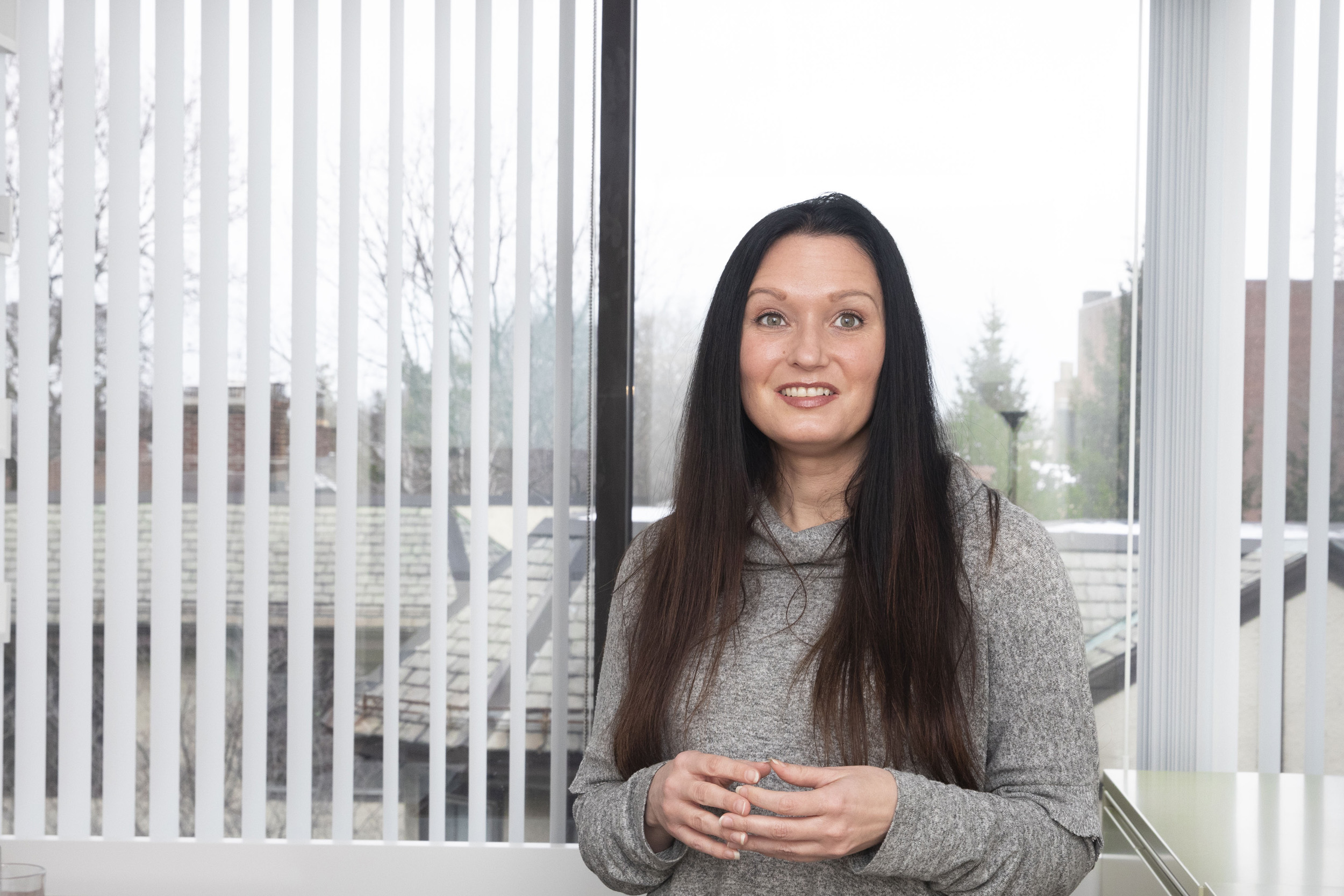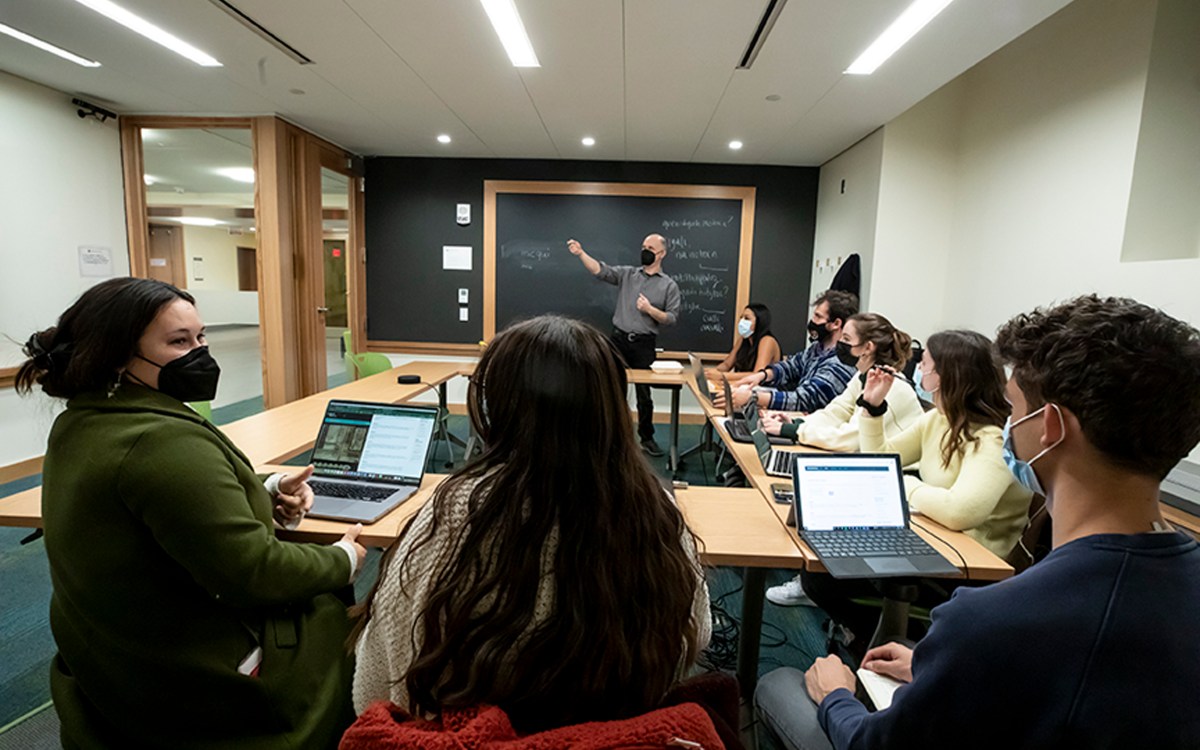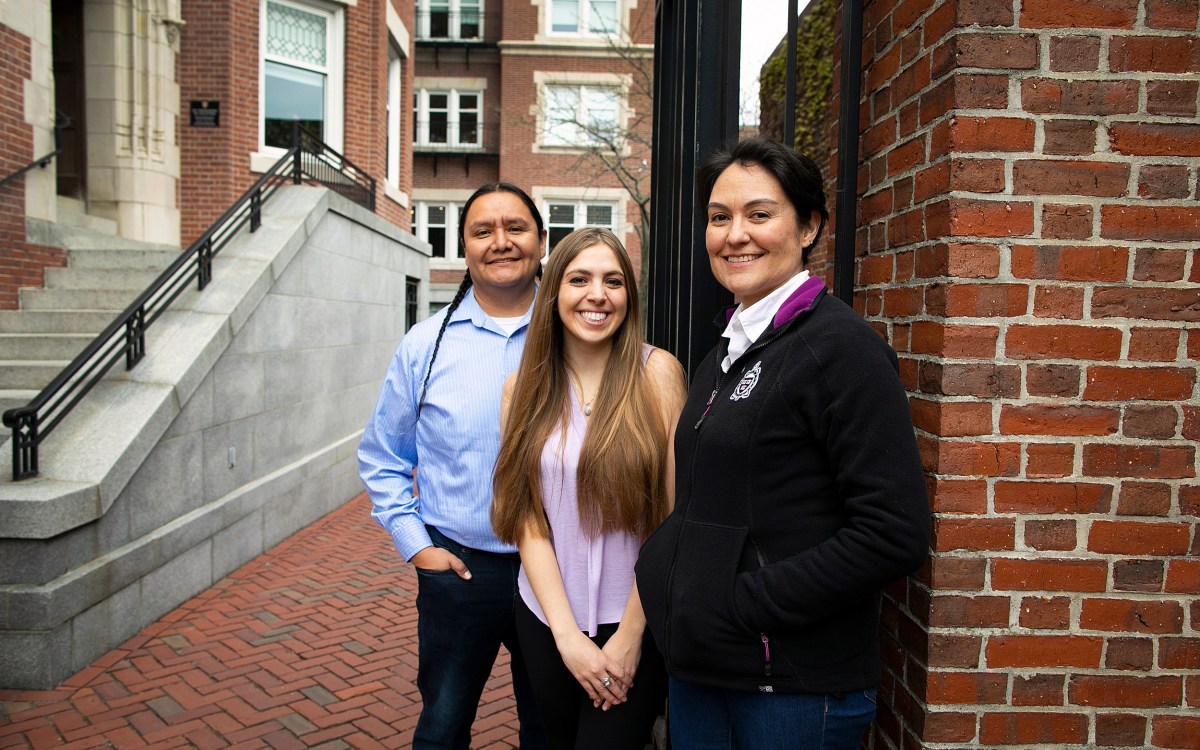
HUNAP director Kelli Mosteller wants to show promising Native youth that Harvard is an attainable goal and the initiative is here to assist and guide them.
Kris Snibbe/Harvard Staff Photographer
Strengthening ties between Harvard, nation’s Native communities
New HUNAP director Kelli Mosteller outlines goals for program, which has served Indigenous students, alumni, promoted scholarship, recruitment for 50 years
Kelli Mosteller, the new executive director of the Harvard University Native American Program, says her goals include highlighting the initiative’s importance to Indigenous communities and strengthening the University’s bonds with them. Mosteller, an enrolled citizen of the Oklahoma tribe, took the helm at HUNAP in July after more than a decade as executive director of the Citizen Potawatomi Nation’s cultural center. She has a Ph.D. in Native American history from the University of Texas at Austin. The Gazette spoke with Mosteller about her vision for the interfaculty program, which has served Harvard’s Native students and alumni and acted as a vehicle for scholarship, recruitment, and support for 50 years.
Q&A
Kelli Mosteller
GAZETTE: When your appointment was first announced, you said that Harvard was “uniquely positioned to bring together thought leaders and academic resources to make a significant impact in Indian Country.” Could you expand on that?
MOSTELLER: Everybody understands that Harvard is one of the leading academic institutions in the world. But in the United States and in Indian Country, Harvard has a large, and sometimes troubling, presence. A lot of Harvard’s history is tied to Indigenous peoples and has shaped our relationships with institutions of learning, institutions of research. Using that power and influence in consultation with tribal communities [and] in partnership with tribal initiatives means that Harvard can be the leader in these areas. What happens here really does set the pace and set the standard for what relationships with other universities [and] other national institutions can look like. Before coming to Harvard, I worked for my tribe for 12 years, so it was really important for me to keep a relationship with tribal communities. I want anybody in Indian Country [who wants] to know about Harvard to feel like HUNAP is a resource. If they have a brilliant student they want to send here, but they’re scared to send their kids away from their support networks or worry that no one’s going to take care of them … I want HUNAP to be able to be that place where they can come and say, “Can you tell me about your experience with Harvard and what my experience with Harvard can be with your assistance and guidance?”
GAZETTE: With a semester under your belt, can you talk about some goals you have for HUNAP?
MOSTELLER: I came in at a time when the University was opening back up from pandemic shutdown, but everyone was just sort of getting their feet under them. We had a few events, but we were still figuring out the lay of the land. As we move into this spring semester, our calendar is packed with in-person events bringing guest speakers onto campus, alumni returning to speak on panels, and bridging that gap between the alumni and the current student experiences. [We’re also] helping other programs to bring in more Indigenous speakers and researchers. We have a higher number of self-identified Indigenous students at Harvard right now than we have at any other time in history, so student services is something that we’re very excited to think about. What does it mean when you’re serving the largest Native community that we’ve ever had? How do we continue to meet those needs, but also build out some of these networks?
GAZETTE: Do you have any specific initiatives you’re putting in place?
MOSTELLER: One of the most significant things that we’re doing is bringing back the Harvard Powwow. Two thousand and nineteen was the last time we hosted the Harvard Powwow. This year, because it is the 25th anniversary, we’re going to make it a larger celebration by giving awards to a handful of individuals who have really had an impact on HUNAP. We are [also] having the largest-ever HUNAP commencement because of our ballooning student enrollment. Some of the other things that we’re looking to do are partnerships with various Schools.
“We have a higher number of self-identified Indigenous students at Harvard right now than we have at any other time in history, so student services is something that we’re very excited to think about.”
GAZETTE: You have worked with Native American Graves Protection and Repatriation Act, or NAGPRA, in your tribal role. How do you see that work informing your current position?
MOSTELLER: My work with NAGPRA was one of the reasons I was actually interested in coming to work here. My history with Harvard was being on the opposite side as a NAGPRA officer for my own community and knowing that Harvard had over 6,000 ancestors still in their collection. I knew that Harvard had a history with NAGPRA that was not great. Historically, it was one of the institutions that really was not meeting the spirit of the law.
In my first interview, before I even stepped foot on Harvard’s campus, I was able to get on a Zoom call and say, “You all do not have a great right track record. Can we talk about that?” Everyone I talked to said, “We understand Harvard’s history. We are actively working to remedy that history. Our efforts moving forward, and for the last few years, have very much been centered on the spirit of NAGPRA. There is no question that these ancestors need to go home. They do not belong here. Human remains do not belong at a university.”
I would not have felt comfortable coming to Harvard if I had not received the responses that I received from people who are here now and working on these issues. They are absolutely dedicated to successfully carrying out repatriations and to being in compliance with NAGPRA, both in the letter and in the spirit of what it was meant to achieve.
GAZETTE: To your point, last semester Claudine Gay, Edgerley Family Dean of Harvard’s Faculty of Arts and Sciences, said that she knows these remains and cultural items need to be repatriated and that the University knows they do not belong here. Could you comment on that?
MOSTELLER: I was very, very excited when I saw Dean Gay — now President-elect Gay —make those comments because Harvard, for good or for bad, is influential in setting standards for other universities. If Harvard can get out in front and be a leader on making sure that NAGPRA is being carried out in a respectful way, that repatriations, even those that fall outside of NAGPRA, are being done in a respectful way … that is so critical. There are still universities that firmly believe that the ancestors should remain with them, that they are better off at a university as subject matter [or] as research materials. Hearing leadership at Harvard, say, without hesitation, these ancestors and these cultural items belong back with their communities really does mean something.
GAZETTE: What do you want the next generation of students to know about HUNAP?
MOSTELLER: As a Native woman who came from very rural Oklahoma, no one in my life had ever told me that I could go to a university like Harvard. That was never even in the realm of what seemed possible. But I am bringing to my position here my experience of being a Native woman who went to college, who went off to grad school, as one of the first of my family to ever do that. Looking at it from my experience on the ground, working for my own community and now coming here, I just want all Native people to know that it is possible. There are so many promising Native youth who just see Harvard as too distant and elite and unattainable, and that isn’t true. I want them to know that we are here to help them through the stumbling blocks but will also be here as relatives and as family so that they have someone to connect to here.






